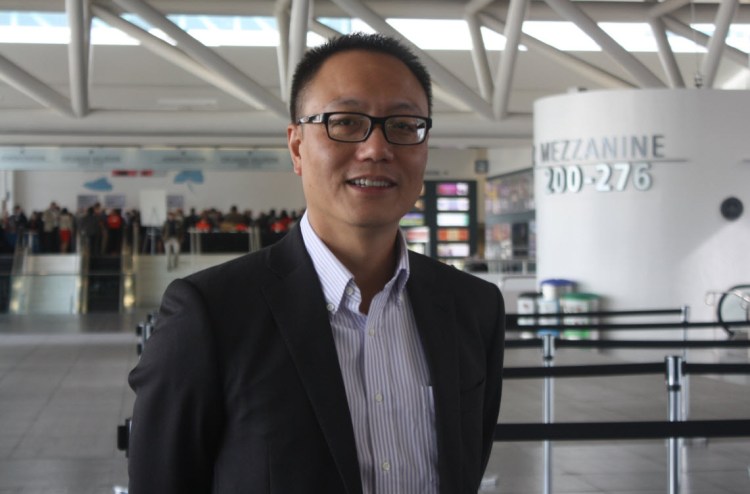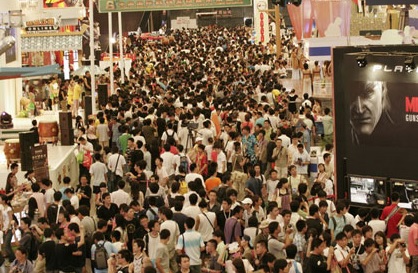After a decades-old ban, Microsoft and BesTV plan to launch the Xbox One video game console in China this September, adding a possible 500 million potential customers for the console industry. To take advantage of that opportunity, Chinese game publisher Perfect World has at least three games in the works for the console’s launch.
That aggressive development schedule is part of the plan by Robert Xiao, the chief executive of Perfect World, to become a global game publisher. Perfect World has more than 4,700 employees, including more than 2,000 in research and development, making it larger than Zynga. But the company isn’t well known in the West or outside of China. The 15-year-old publicly traded publisher has made a lot of money with online games in China, but it is barely scratching the surface in the U.S. market.
To change that, Xiao is launching the console games, and his company has invested in 20 game companies, including acquiring Cryptic Studios, maker of Star Trek Online, in the U.S. Among Perfect World’s games are the Dungeons & Dragons MMO Neverwinter, Torchlight II, and Blacklight Retribution. Xiao plans to expand that, and his ambitions are the reason why we’ve chosen Total World Domination as the theme of our GamesBeat 2014 on Sept. 15-16.
Here’s an edited transcript of our interview.
GamesBeat: In October, you were talking with me about going into mobile games. Can you bring me up to date on what’s happened since then?
Robert Xiao: Back then, we had only three or four games launched in China, including one hit game, Return of the Condor Heroes. That game has performed very well, and not only in China. We launched it in Taiwan and Korea. Both are doing very well. The game has been going steady up until now. It’s on the hardcore side for mobile. We expect that it’ll have a longer life cycle than most casual games.
Aside from that, we have 10 to 20 different games in our development pipeline to be released in the next 12 months. The mobile strategy is, we’re starting with more hardcore games. We’re moving fast on that. We’re seeing people spending more time playing hardcore games on mobile, at least in China. We believe we’re capturing that slice of the pie.
GamesBeat: You’re one of the potential keynote speakers at ChinaJoy, the big game tradeshow in Shanghai. I wonder what larger topics you’d like to address in front of an audience like that. Could you describe what that event is like for a Westerner, someone who isn’t familiar with it?
Xiao: I don’t know if I want to say anything too serious, but China Joy, on first impression—It’s a very crowded, noisy, Mardi Gras type of event. There are game companies and game journalists and game consumers from every corner of the world come to celebrate the culture of gaming. This year, I’m not sure, but it seems like it’s getting hotter and hotter, especially with the topics of both mobile and console coming up. Microsoft and Sony are both setting up stages at China Joy. They’re putting big dollars into promoting their platforms.
From my side, I don’t know what I would talk about yet, but eventually I’ll share some of my views from traveling around the world, talking to different people, and looking at different markets. I want to offer a global perspective. Being a purely Chinese developer and publisher is the past for us.
I just came back from Russia. I stayed for only two days, but I met a lot of people and talked about games in Russia as well. It was very interesting. It’s a growing market. Global players like us have a chance in emerging markets like that.
GamesBeat: What is the larger state of the mobile game industry in China? I was talking to an executive who is going to ChinaJoy. They were saying they’ll have a whole mobile pavilion there, a hall dedicated to mobile games.
Xiao: Mobile is definitely becoming very big. It’s explosive. People are coming from all directions toward mobile platforms. For us, it’s simple. We’ll use our abilities for building hardcore RPG-type games to start, but we’re not going to stop with replicating the games we’ve done on PC. We’re exploring different areas, more casual games. At the same time, we’re looking for new kinds of gameplay on mobile.
Other than the product side, we’re building our capabilities in distribution. We’re setting up our own channel in China. We have enough consumers on our platform that we can analyze, based on their data, to understand the consumer better and try to build mobile products according to their needs.
GamesBeat: Can you describe your emphasis in more detail? Is it iOS or Android? Is it all free-to-play? Are you aiming for longer game sessions? Is the cultural content primarily focused on China?
Xiao: Our most recent hit, Dawn of the Immortals, is based on the same IP as our PC game Battle of the Immortals. It’s a more western type of RPG. It’s true 3D. It’s probably the best-looking 3D game on mobile now. It’s very hardcore. The initial response from consumers has been good. It’s been released for a week and a half now in China, and it’s done well.
In terms of type, we’re not limiting ourselves to only Chinese types of games. In China, we do try to utilize a lot of specifically Chinese fantasy and historical-driven games, but at the same time we’re exploring different kinds of graphical expression, especially using more western types of characters. We’re trying to create a more global sense around our products. We’re aiming to create products that aren’t only limited to China. We want to export them to every corner of the world.
RPGs are very important. That’s our focus point for now. But eventually, as I said, we don’t want to limit ourselves to RPG. We’re also limiting ourselves to the typical free-to-play model. We invested recently in some smaller studios that are producing single-player games for mobile. They’ve been doing well as far as producing smaller-scale, shorter-cycle games on a pay-per-download model. We’re exploring every corner as far as the production side of mobile.
GamesBeat: Can you describe Perfect world for a Western audience in more general terms? I think you had 4,500 people last time we talked. Where are you now?
Xiao: We’re about the same, maybe 4,700 or so. I can’t release exactly how many are dedicated to mobile. But we have more than 2,000 people dedicated to R&D, to product development in general. An increasing number of those people are working on mobile.
We structure ourselves into studios. We don’t have studios specifically dedicated to mobile games, though. We have studios working on titles. Many of them are using a given IP to create PC games and mobile games at the same time.




